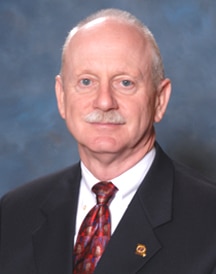Almost a year has passed since Mike Futhey, Arty Martin and Kim Thompson took office.
They ran on a platform of specific promises, including full disclosure. Following are Futhey administration promises and results, so far:
Promise #1: Restructure the International by reducing the number of International officers in Cleveland,and providing the most possible assistance to general committees, state boards and local officers.
Results: The vice president-administration duties were consolidated with those of the general secretary and treasurer (GS&T), and that vice president position was reassigned to the field. All full-time officers are assigned on a full-time basis and are required to make detailed and timely reports of their activities.
Communication with local officers was expanded, especially through visits to locals and general committees by the International president, assistant president, GS&T and International vice presidents.
Also, the UTU Alumni Association was restructured to provide greater interaction between the UTU International and retirees.
Promise #2: Automate more functions.
Results: The Information Technology Department has accelerated the conversion of critical data from an antiquated mainframe computer to modern operating systems.
Direct deposit of dues, DIPP and UTUIA insurance premiums was implemented on CSX and portions of UP, with other national- agreement carriers to be added in 2009.
Automation of billing and auditing is underway.
Also, the iLink platform was expanded for use by general committees and state boards, allowing improved and more rapid access. iLink will be directly accessible from the UTU Web site by Dec. 1.
Promise #3: Expand education opportunities.
Results: The computer-based UTU University was created, providing structured, self-teaching programs through iLink. Group instruction, to assist officers in getting started, is underway.
The awards database search engine is being improved.
Regional meeting workshops are being fine tuned to better meet member needs, especially for officers administering the National Labor Relations Act.
Promise #4: Grow and protect the International’s finances.
Results: UTU International funds have increased by $3.4 million — some 45 percent — to $11 million since Jan. 1. They are managed for the most effective return consistent with a conservative investment approach.
Also, organizing of unorganized airline, bus and rail properties has been accelerated.
Promise #5: Expand the Bus Department.
Results: More aggressive organizing is underway of bus properties in the Northeast and on the West Coast.
Also, regional meeting workshops were beefed up to provide greater understanding of labor laws affecting bus members.
Promise #6: Yardmaster commitment.
Results: While there no longer is a vice president of the Yardmaster Department, a yardmaster vice president position remains within the International headquarters to provide assistance as requested.
Promise #7: Airline commitment.
Results: In spite of the demise of Big Sky Airlines, the assistant president is assigned to search out the unorganized in the aviation industry. Discussions are underway on two airline properties, where employee interest in the UTU, based on the quality of representation at Big Sky, is strong.
Promise #8: Improve the ability and ease of researching controlling awards.
Results: iLink now provides better access to controlling awards, plus secure chat rooms for various levels of elected officers to exchange information and ideas.
Promise #9: Grow the UTU through the right merger with the right organization, and provide full transparency in the process.
Results: The UTU International is aggressively defending attempts by the SMWIA to force a merger in the face of a federal court decision that members were not provided information on conflicts between the two constitutions prior to casting ballots in 2007.
Promise #10: Improve member services.
Results: Leadership reports are posted to the UTU Web site for member inspection.
Meetings have been held regularly by senior International officers with general chairpersons and state legislative directors in an open-forum format.
A monthly UTU News feature introduces members to UTU employees, and explains what they do.
Promise #11: Engage in successful contract negotiations.
Results: A new national rail agreement bettered the pattern was negotiated in January, and was overwhelmingly ratified by the membership.
Arbitration on training and service-scale is scheduled to commence in early December.
Also, UTU International officers are available to assist general chairpersons, as requested, including providing assistance in negotiating individualized agreements to satisfy the new rail-safety bill’s changes to hours of service and limbo time.
Advice on complying with the FRA’s emergency ban on use of electronic devices in the cab has been posted on the UTU Web site.
Advice on how hours-of-service changes in the safety bill will affect members will be posted by Dec. 1. Those changes are not effective until July 2009.
Promise #12: Expand the legislative agenda and deliver on those promises.
Results: The UTU provided leadership in passage of the Rail Safety Improvement Act — the most sweeping safety reform in 30 years. Included is a provision permitting general chairpersons to sit down with carrier labor relations officers and negotiate a better balance between time off and earnings, while preserving guaranteed time off.
UTU efforts to elect Barack Obama and labor friendly lawmakers exceeded any effort ever mounted by a labor union.
The UTU will continue efforts to fix the commercial driver’s license problem, and will work with the AFL-CIO to identify qualified nominees for regulatory agency positions in the Obama administration.
“We have achieved solid gains in pursuing platform objectives,” said UTU International President Mike Futhey. “We are committed to building on the accomplishments of the first year, and identifying new objectives to serve the membership.”
